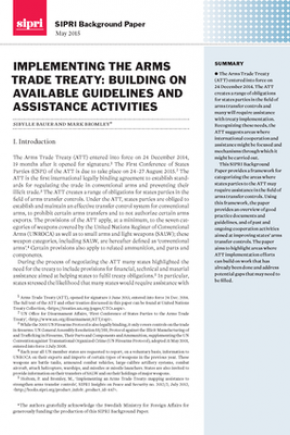The independent resource on global security
Implementing the Arms Trade Treaty: Building on Available Guidelines and Assistance Activities
The Arms Trade Treaty (ATT) entered into force on 24 December 2014. The ATT creates a range of obligations for states parties in the field of arms transfer controls and many will require assistance with treaty implementation. Recognizing these needs, the ATT suggests areas where international cooperation and assistance might be focused and mechanisms through which it might be carried out.
This SIPRI Background Paper provides a framework for categorizing the areas where states parties to the ATT may require assistance in the field of arms transfer controls. Using this framework, the paper provides an overview of good practice documents and guidelines, and of past and ongoing cooperation activities aimed at improving states’ arms transfer controls. The paper aims to highlight areas where ATT implementation efforts can build on work that has already been done and address potential gaps that may need to be filled.
Table of contents
I. Introduction
II. Assistance and cooperation and the ATT
III. Obligations under the ATT and relevant guidelines and activities
IV. Conclusions and recommendations


